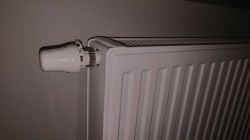FAQ
TL;DR: Bedrooms should be �30 dB LAeq at night, and "should not exceed 30 dB LAeq". To fix a rumbling radiator, test the TRV head, verify flow direction, and adjust pre-setting to stop resonance. For tenants and homeowners losing sleep to radiator noise. [WHO, 1999]
Why it matters: Quieter, balanced heating protects sleep and reduces wear on valves and pumps.
Quick Facts
- Target indoor bedroom noise: �30 dB(A) LAeq at night for sleep quality. [WHO, 1999]
- Typical TRV noise starts when across the valve exceeds �80.2 bar; keep below �80.1�80.2 bar. [IMI Hydronic, 2016]
- Bleeding a radiator takes about 2�85 minutes and can silence air-related gurgling. [Energy Saving Trust, 2023]
- Typical TRV insert ��8010�825; full valve �8020�860; 30�860 minutes labour. [Checkatrade, 2024]
- Bottom connections often include integral pre-setting adjustable with a flat screwdriver. [Elektroda, JasomiT, post #18324120]
What causes a radiator to rumble or vibrate at night?
Flow-induced resonance or cavitation can excite parts inside the valve or radiator. Narrow channels or a restrictive orifice amplify the sound. The noise may originate elsewhere and travel through the pipes. Stabilize flow and pressure, or change the valve type or insert. This addresses the resonance that creates the audible hum or roar. [Elektroda, Cowboy zagrabie, post #18320530]
How do I diagnose the noise in 3 steps without draining?
Use this quick flow test:
- Remove the thermostatic head to force maximum flow.
- On bottom connections, tweak the pre-setting slightly with a flat screwdriver.
- Listen. If the noise changes or stops, note the setting and refine.
These steps help you find whether head control or pre-setting causes resonance. Many bottom connections allow this non-invasive check. [Elektroda, JasomiT, post #18324120]
Can reversed flow through a TRV cause knocking?
Yes. A thermostatic valve installed against its flow direction can oscillate. The spring force and flow pressure fight each other, and the needle can chatter. As one user put it, "the valve needle jumped." Verify the flow direction matches the arrow on the valve body. If reversed, correct the piping or use a bidirectional valve insert. [Elektroda, Loker, post #18320820]
How do I check which side is supply on my radiator?
Start from cold. Open the valve and feel both pipes near the radiator. The pipe that warms first is the supply. If the opposite side warms first, flow is reversed for that radiator. Use this check before adjusting valves or swapping inserts. [Elektroda, dziubek102, post #18322079]
Should I remove the thermostatic head to test?
Yes. Removing the head forces full opening and eliminates head-controlled throttling. If the noise stops, the head or valve insert is implicated. Refit the head and test different settings to confirm. As one expert advised: "remove the valve head." Replace components only after this quick check. [Elektroda, roman 18, post #18321786]
Could debris or rust in the valve cause humming?
Yes. A rust flake or contamination near the valve seat creates turbulence. That local restriction can hum or resonate under flow. Inspect and clean accessible strainer points, or replace the insert if contamination persists. Flow normalization usually removes the noise source. [Elektroda, JasomiT, post #18320429]
Is this rumble actually vibration from loose mounting?
It can be. A vibrating poppet or panel transfers energy to brackets and walls. Ensure the radiator sits firmly on its wall brackets, not hanging on the pipes. Test if fully opening the valve changes the behavior. If vibrations fade at max flow, the valve’s operating point drives the noise. [Elektroda, Zbigniew Rusek, post #18320844]
What if the noise appears only with one radiator open?
With only one emitter open, the pump raises differential pressure. One user reported rumbling and a jumping boiler gauge in that situation. Open a second radiator as a test to share flow. If the noise stops, adjust system balance or pump settings accordingly. Avoid running a single-emitter loop for long periods. [Elektroda, skyguy, post #18320584]
How can I reduce differential pressure and stop valve resonance?
Lower the pump speed or set its proportional control to reduce . Balance emitters to keep across TRVs below about 0.2 bar. A differential-pressure bypass or pressure-independent radiator valves stabilize flows and cut noise. These measures shift valves away from the resonance zone. [IMI Hydronic, 2016]
Do bottom-connected radiators let me pre-balance with a screwdriver?
Often, yes. Many bottom connections hide supply and return pre-setting screws. A small change can markedly alter flow and noise. Remove the heads, adjust in small increments, and log start positions. Re-test after each change for stability. [Elektroda, JasomiT, post #18324120]
Do I need to replace the whole valve or just the insert?
Start with the insert. It contains the moving parts that can resonate. First, fully open the head and adjust the initial pre-setting. This non-invasive step often resolves the issue. If noise persists, plan an insert swap using the correct model (e.g., Danfoss, Heimeier, Honeywell Home). [Elektroda, BUCKS, post #18322092]
Could the noise be coming from the boiler or heat exchanger?
Yes. Sound can transmit along pipes from the boiler or heat exchanger. Narrow channels in a heat exchanger can favor resonance, creating hum. Listen near the boiler and along mains to locate the loudest point. Addressing the source stops the radiated noise. [Elektroda, Cowboy zagrabie, post #18320530]
Will opening the valve fully help?
It can. Fully opening the valve moves it away from its unstable throttling point. If vibrations disappear, the noise came from partial-throttle resonance. Keep the valve more open and balance elsewhere to maintain comfort. This isolates the mechanism from oscillation. [Elektroda, Zbigniew Rusek, post #18320844]
When should I call a heating pro?
Call a pro if bleeding, checking flow direction, and head removal tests fail. Persistent noise suggests pressure control or balancing issues. A technician can set pump curves, balance circuits, or replace inserts safely. That restores quiet, efficient heating without trial-and-error. [Energy Saving Trust, 2023]



